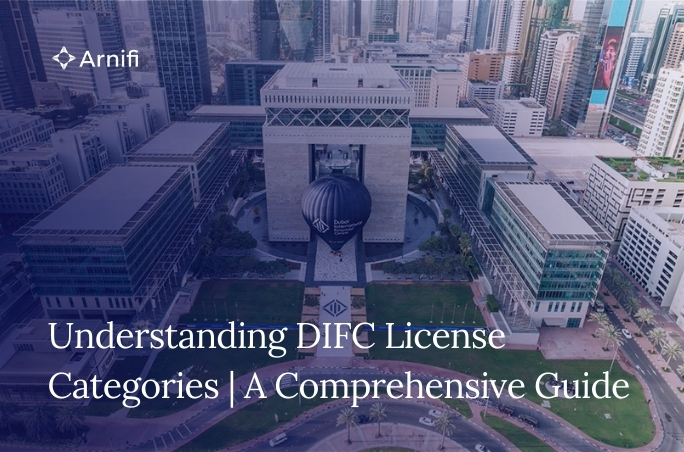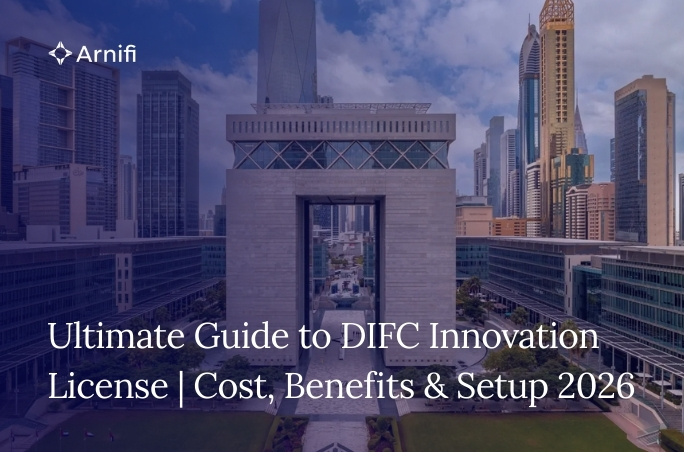Understanding DIFC License Categories | A Comprehensive Guide
by Shethana Aug 12, 2025  6 MIN READ
6 MIN READ

Dubai International Finance Centre (DIFC) is more than just a landmark district; it is a world-class financial centre having its own legal system, a regulator, and an ecosystem that attracts top-ranking businesses from all over the world. Whether you are starting a fintech company or managing assets, or providing advisory services, getting to know the DIFC license categories is a prerequisite for setup, compliance, and growth within this elite zone.
The Arnifi team offers you this guide to guide you through different types of DIFC licenses, whom they are meant for, pricing, and the setup process.
Table of contents
- Introduction to DIFC & Its Licensing Framework
- Non-Financial Business Categories (DFSA‑Exempt)
- Innovation & Testing Licences (Non‑Regulated Path)
- Financial Licence Categories 1–5: The Basics
- Deep Dive into Category 3 Sub‑categories (3A to 3D)
- Category 4: Advisory & Arranging Services
- Category 5: Islamic Finance Licence
- Short-Term, Restricted & Dual Licence Options
- Choosing the Right Licence: Business Scenarios
- Application Process & Timeframes
- Compliance & Ongoing Obligations
- Cost Estimates & Real‑World Insights
- FAQs & Common Challenges
- Conclusion & Action Checklist
Introduction to DIFC & Its Licensing Framework
DIFC is much more than just a free zone; it is an international financial centre under English common law. Its existence is independent of the laws of any other emirate, and it is granted autonomy under the Dubai Financial Services Authority (DFSA) framework, thereby creating a secure and transparent environment for the conduct of financial and non-financial businesses.
Whether starting up or setting up as a consulting or fintech company, one ought to understand the aspects of licensing in DIFC before diving in. Each licensing category is aligned with a business activity, compliance obligation, and sometimes a capital requirement.
Non-Financial Business Categories (DFSA‑Exempt)
If your business doesn’t plan to deal in regulated financial activities, you may qualify for a non-financial license. These are issued under the DIFC Companies Law, not DFSA regulations, and cover areas like management consultancy, HR services, IT firms, and marketing.
These licenses are easier to obtain and less expensive to maintain, making them a smart pick for many service-based businesses looking to tap into DIFC’s premium address.
Innovation & Testing Licences (Non‑Regulated Path)
For startups, DIFC offers unique options like the Innovation License designed for early-stage tech companies in AI, Web3, blockchain, or SaaS.
Another option is the Innovation Testing License (ITL), a sandbox-style permit that allows firms to test their fintech solutions in a live but controlled environment. Both licenses provide cost flexibility, mentoring, and networking within the DIFC Innovation Hub.
Financial Licence Categories 1–5: The Basics
DFSA-regulated entities fall under Categories 1 through 5. These determine the kind of financial activities your firm can carry out, from banking to advisory services.
- Category 1: Accepting deposits, acting as a bank
- Category 2: Lending, managing a proprietary investment fund
- Category 3 (A–D): Brokerage, custody, asset management, payments
- Category 4: Financial advisory and arranging services
- Category 5: Islamic financial services
Each category has specific capital requirements and compliance rules.
Deep Dive into Category 3 Sub‑categories (3A to 3D)
Category 3 is broad, so it’s split into sub-types:
- 3A – Brokerage firms (trading on behalf of clients)
- 3B – Custodian services or fund trustee operations
- 3C – Fund/asset managers handling client investments
- 3D – Payment services and Electronic Money Institutions (EMIs)
Capital requirements can range from USD 500,000 to USD 2 million, depending on the license. The DFSA looks closely at risk, business model, and internal systems.
Category 4: Advisory & Arranging Services
This is one of the most popular licenses in DIFC. It covers:
- Investment advisory
- Arranging credit or investment deals
- Operating crowdfunding platforms
Capital starts from around USD 10,000 but can increase based on your expenses. You may also need special retail or virtual asset endorsements if you’re targeting non-professional clients or crypto-related services.
Category 5: Islamic Finance Licence
Category 5 is for firms providing Shari’a-compliant services such as Islamic banking or sukuk (Islamic bonds). Such companies are mandated to appoint a Shari’a board and to have capital ranging from USD 10 million and upward, depending on the scope. Regulatory compliance in this category is rigorous.
Short-Term, Restricted & Dual Licence Options
DIFC has introduced flexible options such as:
- Short-term licences: Best for project-based or seasonal operations
- Restricted licences: A lower-cost, capped-activity type of permit
- Dual licences: DIFC firms operating outside DIFC then fall under Dubai Economy and Tourism (DET)
The latter categories are perfect for companies that are testing new markets or launching pilot operations.
Choosing the Right Licence: Business Scenarios
Here’s a quick guide:
- Fintech startup → Innovation or Category 3D
- Investment advisory → Category 4
- Brokerage or trading firm → Category 3A
- IT/Consulting firm → Non-financial licence
- Fund management → Category 3C
- Islamic finance firm → Category 5
Always match your core activity with the license’s permissions to avoid future compliance issues.
Application Process & Timeframes
Here’s what to expect:
- Register on the DIFC Client Portal
- Prepare your application (business plan, proof of capital, legal structure)
- Submit documents and pay the initial fee
- DFSA review (for regulated licences)
- Final approval and licence issuance
Non-financial licenses take around 4–6 weeks. Regulated licenses may take 2–6 months, depending on complexity.
Compliance & Ongoing Obligations
Once licensed, ongoing responsibilities include:
- Economic Substance Reporting (ESR)
- Anti-Money Laundering (AML) and KYC checks
- Annual audits
- Appointing local directors and compliance officers
- Periodic DFSA reporting (for regulated entities)
Failure to comply can lead to fines or even suspension of operations.
Cost Estimates & Real‑World Insights
Costs vary by category. Here’s a quick glance:
- Innovation Licence: AED 5,500–7,000/year
- Category 4 (Advisory): AED 200,000–250,000/year
- Category 3C (Asset Manager): AED 300,000+ in year 1
Reddit and forums say advisory budgets to set up and operating costs to be around AED 220,000–240,000 in year one.
FAQs & Common Challenges
Q1: Can I use any name for my DIFC company?
No. Names must be approved and not conflict with others. Have 2–3 backups ready.
Q2: Is banking difficult for DIFC companies?
It can be. Some banks are selective. Having proper documentation and working with local consultants helps.
Q3: Can I skip hiring a compliance officer?
For regulated firms, no. It’s mandatory. For non-regulated firms, it’s optional but useful.
Q4: What if I pick the wrong license?
It’s fixable but costly. That’s why getting it right the first time matters.
Q5: Does DIFC support fintech startups?
Yes, through its Innovation licence and ecosystem programmes.
Q6: Do I need DFSA approval for all licences?
Only financial services licences require DFSA authorisation.
Conclusion & Action Checklist
Setting up in DIFC gives you global credibility and access to a thriving financial ecosystem, but only if you choose the right license.
Here’s what to do next:
- Review your business activity
- Match it to the right DIFC category
- Explore capital and compliance requirements
- Visit DIFC and DFSA for official resources
- Consult experts like Arnifi for a stress-free setup
DIFC offers plenty of room for growth and with the right license in hand, you’ll be ready to thrive.
Top UAE Packages

Related Articles
Top UAE Packages



